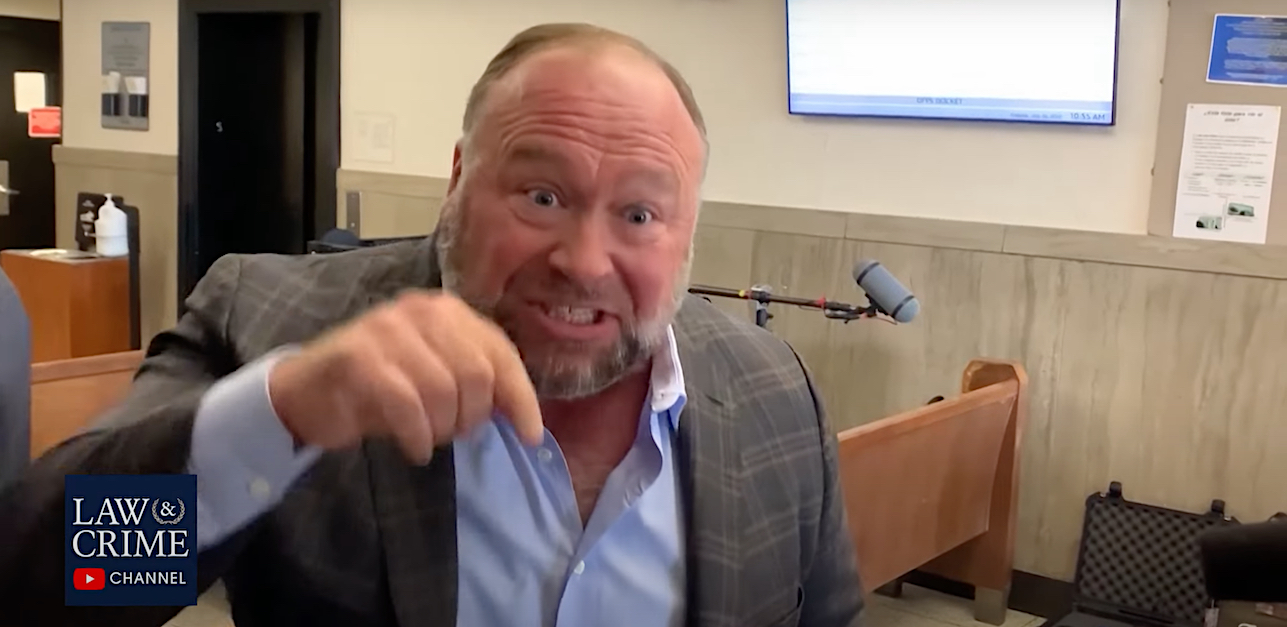
Alex Jones spoke to local reporters during his Texas defamation trial on July 26, 2022. (Image via the Law&Crime Network.)
In Connecticut court documents dated Friday, Infowars host Alex Jones sued his own media company in what his opponents have characterized as yet another last-ditch attempt to stall an upcoming defamation damages trial.
A collection of plaintiffs have sued Jones and several Jones-associated companies for defamation and other torts in both Texas and Connecticut in connection with statements about the Dec. 14, 2012 Sandy Hook school massacre in Newtown, Connecticut. After years of discovery delays and other violations by the defendants, judges in both the Lone Star State and the Constitution State entered a legally rare default judgment against Jones; however, juries have been seated in Texas and will be empaneled in Connecticut next month to ascertain the extent of damages suffered — if any — by the families of the Sandy Hook victims. Jones is currently on trial in Texas to assess damages there; testimony in Connecticut is scheduled to begin in early September after jury selection in August.
The ticking clock in Connecticut appears to have spurred Jones to sue Free Speech Systems, his own media company, according to a filing dated Friday.
“Alex Emric Jones, a defendant in this action, is employed by the co-defendant Free Speech Systems,” the document says. “Free Speech Systems has promised and guaranteed to indemnify and hold harmless Alex Emric Jones from any damages or other costs which may be assessed or entered against him in this litigation.”
What follows is a laundry list of requests by Jones with regards to Free Speech Systems. That list is reproduced here verbatim:
1. An injunction requiring Free Speech Systems to honor and comply with its aforesaid obligation to indemnify and hold him harmless from any damages or other costs which may be assessed or entered against him in this litigation2. An injunction requiring Free Speech Systems to attend and participate in the jury selection and trial of this action;3. Compensatory damages if Free Speech Systems fails to attend and participate in the jury selection and trial of this action and to indemnify and hold him harmless from any damages or other costs which may be assessed or entered against him in this action;4. Treble damages pursuant to Section 52-564 of the General Statutes if Free Speech Systems fails to comply with its obligations of indemnification delineated above.
According to Texas Monthly, Free Speech Systems, Inc., the “business entity that operates both Infowars” and Jones’ dietary supplement company, has not declared bankruptcy. However, as Law&Crime has previously noted, several of Jones’ other companies have.
Texas Monthly said that the Sandy Hook plaintiffs sidestepped the bankruptcies by simply removing the allegedly cash-strapped entities from their civil lawsuits. That rendered the case back to the district courts in Connecticut and New York for proceedings that were only briefly interrupted.
The Sandy Hook plaintiffs in Connecticut immediately criticized Jones’ move against Free Speech Systems with this stinging “emergency motion to strike” the crossclaim:
Alex Jones will do anything to delay trial in this case, including effectively suing himself. Mr. Jones’s five-days-before-jury-selection-starts cross claim against his alter ego company Free Speech Systems, LLC is yet another bad faith tactic meant to obfuscate, to delay, and to create a false issue in this record in preparation for a new abusive bankruptcy filing. The cross claim alleges the fiction that this wholly controlled subsidiary promised to hold Jones harmless for damages in this case, inviting this proceeding to enter Mr. Jones’s conspiracist world where found facts and sworn testimony mean nothing at all. To ensure that Jones does not benefit from this latest ploy, the cross claim should be stricken immediately as untimely and made in bad faith. It must also be stricken immediately because it is pure fiction. It takes two parties to make a contract, and here there is only one: Jones completely controls FSS. Jones knows this and nonetheless filed it, in bad faith.
The plaintiffs’ motion to strike then recaps the reason for the default judgment in the first place: “the Jones defendants’ egregious misconduct and prolonged abuse of process.”
“These cases were filed in 2018,” the plaintiffs noted. “At no time since their filing until now has Alex Jones or Free Speech Systems asserted that a promise of indemnification was made by FSS to Alex Jones.”
The plaintiffs further argued that since a judge closed the pleadings in the case by entering the default judgment against Jones, Jones cannot seek a crossclaim at this juncture in the proceeding. That’s because a crossclaim is, in essence, an addition to the pleadings.
“Further, no motion or request to make this filing was made pursuant to Practice Book Section 10-60,” the plaintiffs noted. The “Practice Book” is a 697-page compilation of Connecticut’s voluminous court rules.
“The trial date is set, it is firm, and it is imminent,” the plaintiffs asserted. “The cross claim is certain to cause delay if permitted. It is also prejudicial: if this supposed cross claim could be asserted in this case, the plaintiffs were entitled to be on notice of it long ago. In short, the cross claim is untimely and should be stricken as such.”
“And there is a far more important point that goes to timing: this cross claim is filed to create confusion and disruption in this case on the eve of trial,” the plaintiffs continued. “Moreover, it is filed in an attempt to insert a sham indemnity claim into this record, so that claim can be argued to a bankruptcy less familiar with the Jones defendants’ litigation chicanery. For this reason, the Court should strike the claim immediately.”
Read the filings below from both sides.